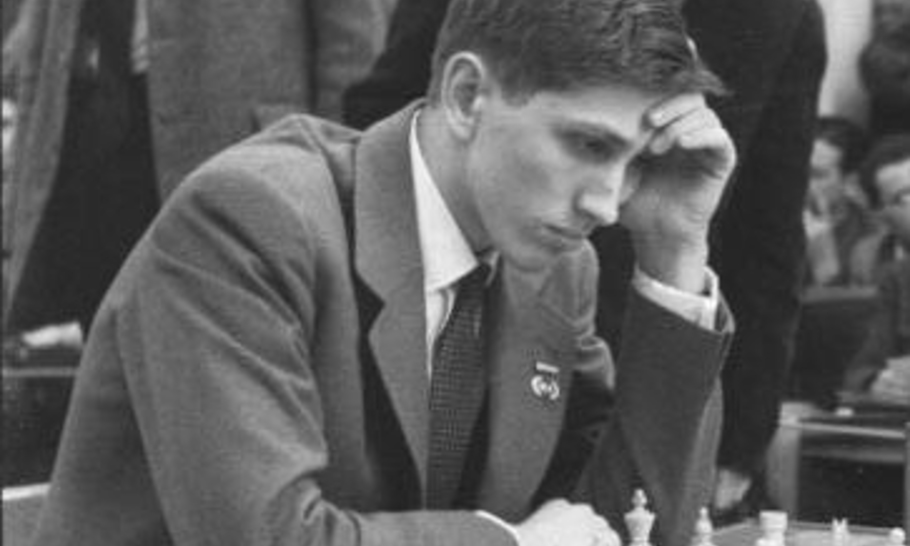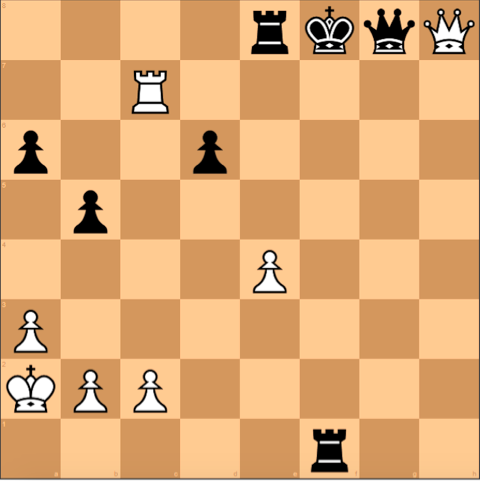Life begins at sixty

What is it about the number sixty that so attracts chess writers? One would have expected the iconic number to have been 64, eight times eight, the total number of squares on the chessboard.
The fashion began, following on from the extended success of one of the most important chess books ever written, Bobby Fischer: My 60 Memorable Games, a classic if ever there was one, published just before, and heralding, Fischer’s spectacular assault on the world chess throne.
Fischer’s anthology (he is pictured above) is packed with brilliant games against the world’s best, a plethora of inspirational openings ideas and some of the best notes ever written by a true virtuoso of the game.
My Sixty Memorable Games has also been responsible for one of the great controversies of chess literature. The casus belli arose when the English writer and Grandmaster John Nunn published a new “improved” edition of Fischer’s book and committed a curious error, while ostensibly refining Fischer’s analysis (always a perilous undertaking, by the way).
We join the game Fischer v Bolbochan, Stockholm 1962, after White’s 35th move.

Here Bolbochan played 35…Rxf4 and went on to lose. Nunn pointed out the alternative line 35…Kh8 36. Nxg6+ Qxg6 37.Rxg5 Rf1+ 38. Ka2 Qxg5 39. Qh3+ Kg8 40. Qh7 + Kf8 41.Qh8+ Qg8 42. Qh6+ forcing checkmate. The only problem is, that it doesn’t. Take a look at the next …
[position after 41… Qg8+!]

And it becomes clear to the veriest neophyte that Nunn, by proposing 42 Qh6+ in the second diagram, had left Fischer’s king in check. Fischer, never the most patient or tolerant of commentators, was duly and super-sonically outraged. The reverberations of his ballistic denunciation of the English grandmaster’s combination of arrogance and incompetence could soon, and easily, be heard around the chess world.
A more auspicious homage to the immortal Bobby Fischer has arisen in two works by the renowned chess writer, Grandmaster Andrew Soltis, who has delivered a brace of magisterial books on two of today’s blockbuster chess exponents, Magnus Carlsen and Fabiano Caruana. Magnus Carlsen: Sixty Memorable Games and Fabiano Caruana: Sixty Memorable Games.
World champion Magnus Carlsen has been the world’s number one player for more than a decade. He has won more super-tournaments than anyone ever, with the possible exception of Garry Kasparov, yet Carlsen is still in his prime. He is the only player to repeatedly win the world championships in classical, speed and blitz chess formats. This book details his remarkable rise and how he acquired the crucial computer-friendly skills of 21st-century grandmaster chess.
Carlsen most recently defended his world championship title last autumn and, by winning, set a modern record of five consecutive outright championship match victories. A hundred years ago, the immortal Emanuel Lasker had set the pace by winning five matches against Steinitz (twice) Marshall, Tarrasch and Janowski. This book shows how Carlsen wins, by analysing 60 of the games that cemented his reputation , describing the intricacies behind his strategies, the tactical justification of moves and the psychological battle in each one.
At more or less the same time, the indefatigable Soltis has produced a parallel account of Fabiano Caruana’s sixty most memorable games. This will doubtless be identified as the definitive account of how a remarkable pre-teenager decided to became a professional chess player at the tender age of 12 and then went on to achieve one of the greatest winning streaks in chess history.
As the publishers Batsford point out, these 60 games provide invaluable insight into how pragmatism, calculation and intuition have become the formula for success in 21st-century chess. It is packed with practical advice and tips that will be useful to all aspiring players, from newcomers to experienced tournament competitors.
After the classical games of their London 2018 world title match ended in a tie, Magnus Carlsen admitted that his challenger, the self same Fabiano Caruana, had earned the right to call himself his equal. Despite Caruana’s defeat in the rapid playoff, he has been the champion’s constant rival and perennially second highest rated player in the world.
This book explains what unique qualities have brought Caruana such consistent and outstanding results and have singled him out from other members of the world’s chess elite, including Magnus Carlsen and his latest (unsuccessful) challenger, Ian Nepomniachtchi.
International Grandmaster Andrew Soltis has been the acclaimed columnist of Chess Life magazine and the New York Post for more than 40 years. He is the author of more than 100 books, including the popular titles The Chessmaster Checklist and 500 Chess Questions Answered.
Soltis has reached new heights with these two new books. The format is clear, the material substantial, the insights into all forms of modern chess (online, rapid and all the variants forced on us by the circumstances of the Covid pandemic) are illuminating and, most importantly, the notes provided by Soltis are pithy, enlightening and accurate, endorsed by the latest and most sophisticated of computer analysis.
In fact, Soltis can now aspire to be numbered amongst those classic immortals of the anthology genre, such as Peter Clarke on Petrosian and Tal, Golombek on Capablanca, Tal on himself, Giddins on Bronstein and Kasparov on his great predecessors. Soltis has attained a new level with these books. My only suggestion for improvement is that both volumes would have benefited from a selection of tournament and match results, illustrating graphically the peaks which these grandest of grandmasters can attain.
The links to this week ’ s games show Caruana’s supreme artistry against Ponomariev and Carlsen’s original and creative determination in overcoming the super solid Giri at Zagreb 2019.
Raymond Keene’s latest book “Fifty Shades of Ray: Chess in the year of the Coronavirus”, containing some of his best pieces from TheArticle, is now available from Blackwell’s
A Message from TheArticle
We are the only publication that’s committed to covering every angle. We have an important contribution to make, one that’s needed now more than ever, and we need your help to continue publishing throughout the pandemic. So please, make a donation.





